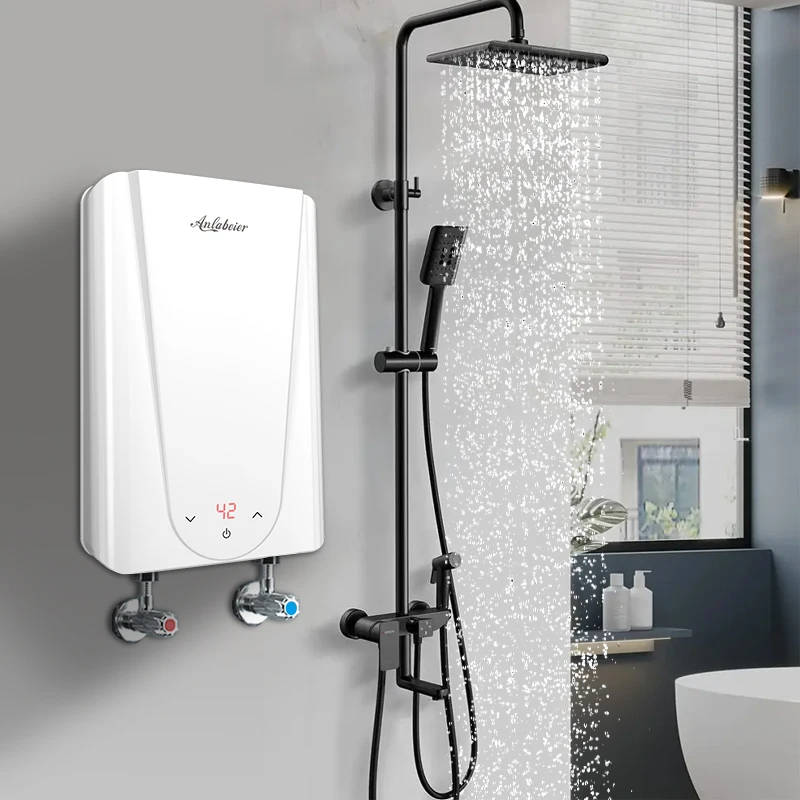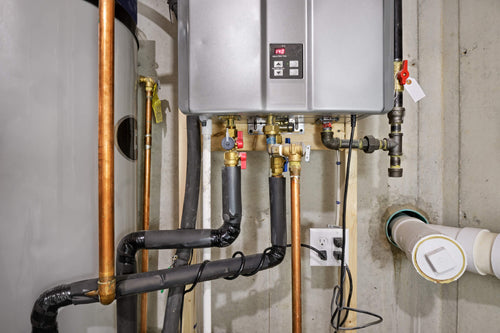The publisher is making several good annotation related to Pros and Cons of Tankless Water Heater as a whole in the content down the page.

In a globe where convenience and efficiency preponderate, it's no surprise that homeowners are regularly on the lookout for smarter methods to manage their home's energy intake and comfort. One development that has steadily gotten appeal is the tankless water heater. However just what makes these systems stand out from the conventional tank-based versions a lot of us matured with? Allow's dive in and explore the advantages of tankless hot water heater, assisting you decide if it's time to make the button in your house.
Introduction
Photo this: you step into the shower after a long day, expecting a relaxing cascade of hot water, only to be greeted by icy droplets because the last individual utilized all of it up. Audio acquainted? Standard water heaters store a set amount of hot water, suggesting you go to the mercy of that tank's supply. Tankless systems, on the other hand, warmth water on demand. Say goodbye to running out mid-shower, say goodbye to fumbling with schedules simply to make sure hot water is readily available.
Understanding Tankless Hot Water Heater
What Are Tankless Hot Water Heater?
Tankless water heaters, often called on-demand or instant hot water heater, provide hot water only as it's needed. Rather than saving gallons of pre-heated water, these units kick into action the moment you switch on the tap. Water travels through a warmth exchanger, warming up in real-time, meaning you get a continuous circulation of warm water without the requirement for a large tank sitting lazily by.
How Do They Differ from Standard Equipments?
Typical heaters hold a reservoir of hot water, using energy to keep that container at a regular temperature. Tankless units remove the standing supply, lowering thrown away power and the large impact of a big cylinder. Basically, you're updating from a "accumulation" way of thinking to a "made-to-order" approach.
Typical Kinds Of Tankless Units
Tankless water heaters typically can be found in two selections: gas and electric. Gas models often tend to provide greater circulation prices, suitable for larger homes, while electrical versions usually serve smaller sized homes and are normally simpler to mount. In addition, some systems are developed for point-of-use (offering one fixture) while others can manage the entire home's warm water needs.
Key Advantages of Tankless Water Heaters
Power Performance and Price Savings
No more heating a giant tank's well worth of water and maintaining it warm throughout the day. Tankless heating systems lower standby power losses, which can decrease utility expenses. While the preliminary price may be higher, the lasting financial savings often warrant the financial investment.
3. Space-Saving Layout
If your home is short on storage space, eliminating the large tank liberates useful area. Tankless units are small and can commonly be mounted on wall surfaces, hidden in edges, or set up in limited energy wardrobes without monopolizing the entire space.
4. Longer Life-span
A well-kept tankless water heater can outlive its tank-based relative. Traditional containers may last 10-15 years, while tankless models can keep downing along for twenty years or even more, making them a solid investment with time.
1. Limitless Hot Water Supply
Ever needed to schedule showers so every person gets their reasonable share of hot water? With tankless, that ends up being a distant memory. As long as the heating system's flow capability isn't exceeded, you can take back-to-back showers without becoming a popsicle.
5. Improved Water Top Quality
Storing water in a container can in some cases cause sediment build-up or a slightly "off" taste. With tankless systems, fresh water is warmed right away, reducing the chances of debris buildup and possibly using cleaner-tasting water.
Factors to consider Prior To Changing
Though the advantages are compelling, it's important to take into consideration a few factors prior to totally committing.
Reviewing Your Home's Water Use Patterns
If your household simultaneously makes use of several components with high warm water need, see to it the device's flow rate meets your demands. Understanding your usage patterns aids you pick the appropriate size and kind of tankless heater.
Upkeep and Care Tips
Tankless systems are fairly low maintenance, however they aren't set-it-and-forget-it devices.
Routine Cleansing and Descaling
Difficult water minerals can develop in the warm exchanger, impacting efficiency. Regular descaling (often suggested annually) keeps the device running at peak performance.
Annual Professional Examinations
A yearly checkup from a specialist ensures minor issues are caught early. They'll evaluate the unit's performance, search for leaks, and help maintain optimal performance.
First Financial Investment Expenses
Tankless heating units usually include a higher ahead of time cost. Between the device itself and prospective setup alterations, the initial price might give you sticker shock. However remember to see it as a long-term financial investment.
Installation Needs
Depending upon your home's infrastructure, you may require added electrical ability or gas line upgrades. Ensure you comprehend the installment requirements and talk to a professional to avoid shocks.
Making Certain Proper Ventilation
For gas versions, appropriate air flow is important to securely remove exhaust gases. See to it airing vent systems are clean and correctly set up to avoid any type of prospective safety and security hazards.
Comparing Different Brands and Versions
Not all tankless hot water heater are developed equal.
Researching Trusted Manufacturers
Look for respectable brands with a history of generating top quality systems. A reliable supplier usually supplies better consumer assistance and longer guarantees.
Installment: Do It Yourself or Professional?
While some home owners enjoy taking on projects themselves, tankless setup could not be the best time to break out the tool kit.
Pros and Cons of Do It Yourself Installation
A DIY install can save money, but it features risks. Wrong installation can cause ineffectiveness or safety and security worries. If you come in handy and have experience, it may be feasible-- but proceed with care.
Reading Reviews and User Feedback
User testimonials and responses from next-door neighbors or friends that have actually gone tankless can offer important insights. Occasionally, real-life experiences can be more telling than advertising and marketing brochures.
When to Call an Expert Plumber
For the majority of, calling a professional makes certain every little thing's done correctly. A specialist plumbing professional recognizes local codes, sizing demands, and venting specifications, minimizing the threat of accidents.
Maximizing Performance
You have actually invested in a tankless unit-- now maximize its performance.
Optimum Temperature Level Settings
Most people set their units between 120-140 F. Adjusting the temperature can improve convenience and cost savings. Experiment to discover a wonderful spot that doesn't throw away power.
Coupling With Low-Flow Fixtures
Wish to extend your system's capabilities? Consider mounting low-flow showerheads and taps. They decrease water use, allowing your tankless system to provide a consistent stream of warm water without straining.
Ecological Influence
Tankless hot water heater straighten with greener living objectives.
Minimized Carbon Impact
By utilizing less energy and only heating water as needed, tankless systems can lower your home's carbon footprint, decreasing your environmental impact.
Preserving Natural Resources
Much less power usage and less squandered hot water equate right into fewer natural resources being utilized, an ecological win-win.
Who Benefits The Majority Of from Tankless Heaters?
The beauty of tankless heaters is that they can fit a selection of households.
Huge Family Members vs. Solitary Occupants
Large households could enjoy the countless warm water supply, while solitary passengers value the energy savings from not heating a whole container for just one person's morning shower.
Homeowners with Minimal Room
If your home is short on square video, losing the large container frees up space for various other essentials-- or maybe just much more elbow room.
Eco-Conscious Customers
Going tankless aligns with eco-friendly worths, ensuring you're not throwing away power or resources.
Future Trends in Tankless Water Heaters
The globe of home appliances is ever-evolving, and tankless water heaters are no exception.
Innovations in Innovation
R&D is frequently boosting warmth exchangers, making units more effective and sturdy. Future models might be also quieter, more compact, and much better fit for differing environments.
Smart Home Assimilation
Visualize adjusting your water heater's temperature via an app or obtaining upkeep notifies on your phone. As smart home tech advancements, we'll see more connectivity and comfort.
Final thought
Picking a tankless hot water heater is more than just upgrading your home's hot water system; it's investing in lasting comfort, power effectiveness, and a greener lifestyle. By considering your house's water usage, being mindful of installment requirements, and dedicating to normal maintenance, you can delight in a constant stream of hot water without the baggage of a large storage tank. As modern technology advances, you can eagerly anticipate also smarter, a lot more effective tankless solutions that not only make your life less complicated however also benefit the planet.
5 Benefits of Tankless Water Heaters
Save Valuable Space
Since tankless water heaters do not have a massive 40+ gallon tank of water, they are considerably smaller and can fit in more narrow spaces in your home.
If you are working with limited square footage, a tankless water heater will still provide you with the hot water you need while taking up significantly less space in your home. While the exact size of a tankless water heater varies depending on the brand, some are as small as a carry-on suitcase.
Endless Supply of Hot Water
While a traditional water heater preheats and stores your water in the tank, tankless water heaters do not rely on a reservoir system.
This means that they do not run out of hot water like traditional water heaters since they make hot water as needed. Traditional water heaters need to stop and reheat water when the tank inevitably runs out, but tankless water heaters do not have this issue.
Provide Warm Water On-Demand
As mentioned above, tankless water heaters do not preheat a certain amount of water and then store it in a massive tank to be used later. An advantage of installing a tankless water heater includes water being heated instantly whenever you turn on the faucet.
When you turn on the water, it will travel through a heat exchanger in the unit and be heated with either an electric element or a natural gas burner. Gone are the days of having to ration out your hot water to make sure that you do not run out.
Longer Life Cycle
Not only do tankless water heaters provide an endless supply of hot water for your home whenever you want it, but these units tend to have a longer lifespan than water heaters with tanks.
Tanked water heaters have an average lifespan of around 10 years, as the tank is prone to corrosion, leading to serious issues. In comparison, tankless water heaters can last for around 15 to 20 years with the proper maintenance and tune-ups.
Energy Efficient
Compared to traditional water heaters, tankless water heaters are a more energy-efficient water heating option for your home. Tank water heaters must heat and reheat the water stored in the tank throughout the day, even if you are not home.
This energy use adds up over time, leading to an increase in your energy bills and added strain on your unit. A benefit of buying a tankless water heater includes saving money since it only operates when you turn on the hot water. Since it only heats up as needed, this can decrease your energy bills and save you money in the long run.
https://callrandazzo.com/blog/5-benefits-of-tankless-water-heaters/

We hope you enjoyed our article about Unveiling the Hot Trend: The Benefits of Tankless Water. Thanks for spending some time to read through our blog. Do you know about another individual who is inquisitive about the subject? Do not hesitate to share it. Thank you so much for going through it.
Click Here